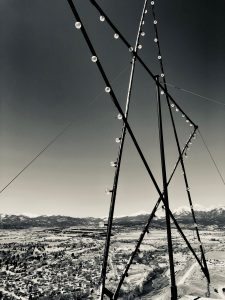Back around February 18th, I wrote the first few sentences of what was to be this blog post. Since that time I’ve written virtually nothing. Six or seven times I’ve false-started. Splurts. Stutterings. I’ve written, rewritten the opening lines in my head and never liked nor bothered with them because the world is unrecognizable and shifting shape and on some level I think I’m scared to write what I believe is true today and have to watch it all change tomorrow.
As if that was different from any other day.
 The most courageous opening to a piece of writing I’ve ever read blew me away when I first found it as a student in 1992 and I still have to sit down every time I revisit it. It became to me the superlative of writing confidence and how could it not — only Toni Morrison steps into a novel with such command, like swinging a frying pan to the head.
The most courageous opening to a piece of writing I’ve ever read blew me away when I first found it as a student in 1992 and I still have to sit down every time I revisit it. It became to me the superlative of writing confidence and how could it not — only Toni Morrison steps into a novel with such command, like swinging a frying pan to the head.
Sth, I know that woman. She used to live with a flock of birds on Lenox Avenue. Know her husband, too. He fell for an eighteen-year-old girl with one of those deepdown, spooky loves that made him so sad and happy he shot her just to keep the feeling going.
I kept thinking about that opening and bravery, trying to channel it into just getting down the first lines of a 1,000-word blog post. I bought Jazz again, to remind myself, and in the much more recent forward to the novel’s reissue in 2004, I discovered that Morrison had actually struggled to start the book, her effort to locate the voice “constantly being frustrated.”
…angered by my inability to summon suitable language…I threw my pencil on the floor, sucked my teeth in disgust, thinking, “Oh, shoot! What is this? I know that woman. I know her skirt size, what side she sleeps on. I know the name of her hair oil, its scent…” So that’s what I wrote. effortlessly without pause, playing, just playing along with the voice, not even considering who the “I” was until it seemed natural…”
I decided Morrison herself had told me it was ok to let go and just start. Say what you know, don’t pause. Just play.
And so.
I know that in January, my husband, son, dog, cat and I had succumbed to a wild hair and packed ourselves into an RV to head across the country, maybe in search of a new way of learning things for all of us, maybe to leave the soap bubble of our known world with a sparkling pop and burrow further into the map heading south, east, southeast, north just a bit, south again.
 We learned so much. That the best dessert in the whole world may come from a food truck in Austin, Texas, called Manolis where the owner leans over the counter, looks you in the eye and whispers conspiratorily, “Tell me what flavors you love.” That rain falls like quicksilver in Mississippi to erase chunks of roads, drown the ground and press ambition into the mud. That lightning cracks horizontally across Birmingham in the evenings to shake its hot, asphalt soul and terrify the uninitiated. We found you can absorb past events – shameful and cruel – through your feet, through the soles of your shoes, things that transpired where you’re now standing, like on this swampy riverside where Andrew Jackson’s army forced scores of Native Americans through the brutal winter of 1838 toward Oklahoma, on foot. Upwards of 5,000 Cherokee, dead of disease and starvation, before the “Indian problem” was considered satisfactorily solved and whites could take possession of tribal lands.
We learned so much. That the best dessert in the whole world may come from a food truck in Austin, Texas, called Manolis where the owner leans over the counter, looks you in the eye and whispers conspiratorily, “Tell me what flavors you love.” That rain falls like quicksilver in Mississippi to erase chunks of roads, drown the ground and press ambition into the mud. That lightning cracks horizontally across Birmingham in the evenings to shake its hot, asphalt soul and terrify the uninitiated. We found you can absorb past events – shameful and cruel – through your feet, through the soles of your shoes, things that transpired where you’re now standing, like on this swampy riverside where Andrew Jackson’s army forced scores of Native Americans through the brutal winter of 1838 toward Oklahoma, on foot. Upwards of 5,000 Cherokee, dead of disease and starvation, before the “Indian problem” was considered satisfactorily solved and whites could take possession of tribal lands.
Within our cramped, swaying quarters, quotidian knowledge blossomed. We now know that paper towels are far more important than we previously understood. So are things that hold other things together: rubber bands, binder clips,string, clothespins, bungee cords. Also, headlamps, lanterns, matches, candles – things offering light. The cat learned how to surf the slick linoleum table at highway speeds. Dessert became a ritual every night and often included something frozen, something chocolate and something chewy enough to threaten your fillings. As for beer and coffee, local means local, but often not much else.
We learned that in the backwoods – and god, there are a lot of them – a house derelict beyond condemnation and strewn with trash is not always empty – sometimes a light is on inside, and the human who switched it on.
In Chatanooga, I learned telling your kid that you’ve suddenly been laid off from your job isn’t easy, and I couldn’t figure out a way to say it that didn’t sound defensive, defeated, whining, or worse, pollyanna. He’s only 12 but he surely knows when his mom says, “When one door closes, another one opens,” she might mean it and at the same time consider it aphoristic crap.

We pushed on. Asheville, North Carolina, taught us trees and mist, a biomass to blow the mind, tacky single track, exotic gin, Indian street food. A few nights with good friends reinflated the gratitude that can flatten when you’re with the same two people for 1,500 miles and nearly three months in a tiny space.
And then Kentucky, where, after three of our planned six months of vagrancy, we realized humanity was being overrun planet-wide by a virus and all the news was worse than bad. A tiny ship off the coast of a smoldering continent, we floated about, torn between going further out to sea or searching for a tiny beachhead. We turned for home because we suddenly knew nothing.
Clever, snappy writing is ideal when you’re not sure what you’re really trying to talk about and we all read this kind of writing all the time, endless dollops of something edible blurting from a tube onto a conveyer belt. We know just what it will be, what color, what flavor, what texture, how our teeth will feel after eating it. Have most of us forgotten how to read or write about direct experience with no smooth ending because it shocks and foments discomfort? Because finding a way through it – a voice out of it – is muscular, undefended work? It’s work that many won’t write, or read. It’s work that some will try to write and find themselves voiceless, until a frying pan comes swinging.
That I’m not sure exactly what I’m saying undoubtedly makes a good argument for never publishing this piece. I think I’m trying to show you a deactivated trajectory, breaking off, swirling into babble. I think I’m trying to feed you, to tell you something as I’m falling through air.
Perhaps it’s this: On our trip, huge swaths of our country appeared to us diametrically opposed to nearly everything we think is important, but “think” is the operative word – because what actually does hold import was emerging from the wreckage no one saw accumulating around us, and at a terrible speed. Even at the beginning, what was to become the pandemic exposed the sinews of human life, the naked similarities that bind and insist, the stupid, fearful, compassionate, divine things we all do every day. All the things we try to start, then try to finish.
 None of what’s happening now feels natural, in the sense of normal, in the sense of reasonably predictable, in the sense of what I knew yesterday or might terrifyingly know tomorrow. But I’ve written long enough now that it feels natural (in the Morrison way) to tell you this little story.
None of what’s happening now feels natural, in the sense of normal, in the sense of reasonably predictable, in the sense of what I knew yesterday or might terrifyingly know tomorrow. But I’ve written long enough now that it feels natural (in the Morrison way) to tell you this little story.
In a grocery store in Arkansas, I did that thing where I turned from taking an item off the shelf and went to mistakenly put it in someone else’s cart. The cart’s owner was a worn-down looking man with an eyepatch and a MAGA hat. In the split second I had to register that, in the split second I’d decided we had absolutely nothing in common, we both giggled and I said, “I thought you might like to buy this maple syrup for me today.” He laughed. “Aw, it’s impossible to tell these things apart,” and we moved off with our carts into our utterly apart worlds — which I had just learned were inextricably joined by being humans walking around, putting things in the wrong place.

